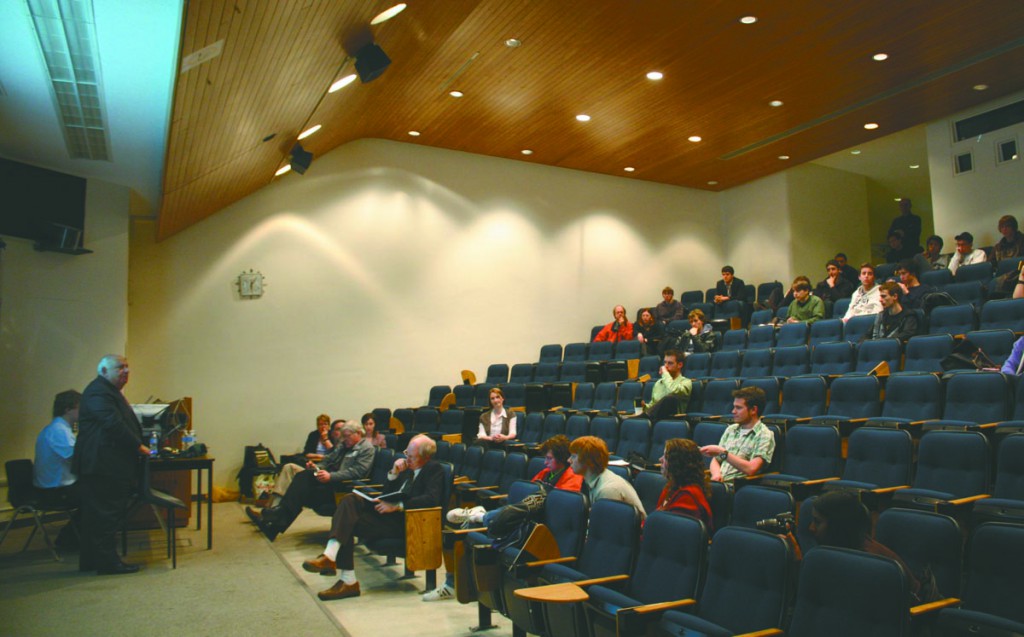On Thursday May 13, students and faculty converged on MC 2066 for the PDEng Town hall meeting following the release of the PDEng Renewal Task Force’s final report which brought “sweeping changes” to Professional Development for Engineering Students.
Dean Sedra, Wayne Parker – Associate Dean, CEPA (Co-op Education and Professional Affairs), and Sasha Avreline – former B-soc VP Education and Task Force member all spoke to students attending the meeting.
Dean Sedra started off the presentation stating “I have total confidence that this process is going to work out, a lot of good people are involved in this transition process and will make it work” before introducing Wayne Parker to the stage.
Dr. Parker’s time on stage mostly was spent talking the next steps for WatPD-Engineering and many details about the planned structure of the program. Major points of his slides touched on the finer details of the program such as planned courses for WatPD-Engineering, the academic oversight committees, the program objectives, and also how current students would transfer to the new program. Current students in the program would finish up to PDEng 25 and then complete their program requirements from the electives available from WatPD or soon to be developed WatPD-Engineering electives.
Sasha Avreline was the last on stage to speak about the Task Force process. Avreline spoke about the Student Experience with regard to the process, near-term changes, and the future before passing the mic back to the Dean for a presentation conclusion.
After Dean Sedra concluded the presentation, the floor was opened to questions from the audience. Questions, directed to Dean Sedra who moderated the Q&A period, were answered by the Dean himself, Recently appointed Academic Director Dr. Gordon Stubley, Dr. Wayne Parker, Associate Dean CEPA and Chair of the Task Force, and the Director of WatPD, Judene Pretti.
One question from audience member stated that many people have contact with first years and future students and asked what they have been told regarding the PDeng situation and what current students should tell them. This was of particular importance since many students generally hear about PDEng and the associated negativity regarding the program which could affect their decision to come to Waterloo. Nevertheless, Dr. Stubley told the audience, that speakers at You@Waterloo Day will be putting together something to inform students in large groups on the changes as well as references to PDEng will be removed from the admissions packages.
Also, many questions came up regarding the selection of the three WatPD-Engineering courses to be taken after the two core courses. Some confusion came up with people questioning if they have three courses which they are forced to take like PDEng or if they had a choice of several courses. The responses from faculty did indicate students will be able to choose between the many WatPD courses already offered or even new WatPD-Engineering courses that might be developed specially for engineering students with an engineering focus. Furthermore, some students in the audience indicated that they may want to take a WatPD-Engineering course that interested them on the final co-op term even if they had fully completed the PDEng program, and by the sound of the response of the Dean Sedra and Pretti, those who wish to complete a course on their last work term may be able to do so.
Also, the Dean acknowledged the time line to create the new WatPD-Engineering core courses for students is very ambitious. A question came up asking what contingency is in place if a high quality course is not ready in time for Winter 2011 – the Dean replied that PDEng 15 would then be taught instead.
Interestingly, on the topic of WatPD-Engineering curriculum testing, Dr. Stubley mentioned high school students in grade 12 will be recruited to test the new WatPD-Engineering core curriculum and not current engineering students to see how new people without prior knowledge of the material react. Even though current students would not likely get to try the material before given to next year’s new students, Stubley did state student representatives do sit on the Curriculum Committee and would be able to provide feedback.
Near the end of the meeting, some confusion arose on the subject of Work Term Reports. One of the recommendations in the Task Force report was to reduce the number of work terms from 4 to 3. This gave some members of the audience the idea that since they had completed three work term reports already, their final one wouldn’t need to be submitted. Also, some first year students on co-op questioned if they would need to submit their first work term report based on this recommendation. Wayne Loucks, Associate Dean for Undergraduate Studies cleared the confusion by stating, “There is no change to the calendar, the degree requirements are as they are. If you don’t hand in a work report when you’re supposed to hand in a work report, it’ll go into your fail count.”
The final question of the night was about the WatPD-Engineering curriculum committee and their existence after the curriculum has been created. Dean Sedra replied by stating “this will be an on-going committee operation.”
For recordings and slides from the PDEng town hall meeting, check out the PDEng Renewal Task Force Page.





Sai Naram
What if I have PDENG 35, do I have to take electives just like PDENG 15 and 25 students?